California’s transgender Latinx people find refuge and empowerment in community
The story was originally published in High Country News with support from our 2023 Domestic Violence Reporting Fund.

At the Spread The Love Picnic in Griffith Park, program coordinator Rita Garcia records the cake-cutting ceremony on her phone. “It's moments like these that help us bond and build trust,” says Garcia.
Zaydee Sanchez/High Country News
On a crisp February morning in downtown Los Angeles, the sun shined on Frida Fierros and her colleague as they spoke to pedestrians on the corner of First and Hill streets. The bustling area, surrounded by courthouses and municipal buildings, was perfect for chatting with commuters. Fierros, 42, wearing her TransLatin@ Coalition pin, conversed in her native Spanish, proudly detailing the services that have helped pave the way for her new life.
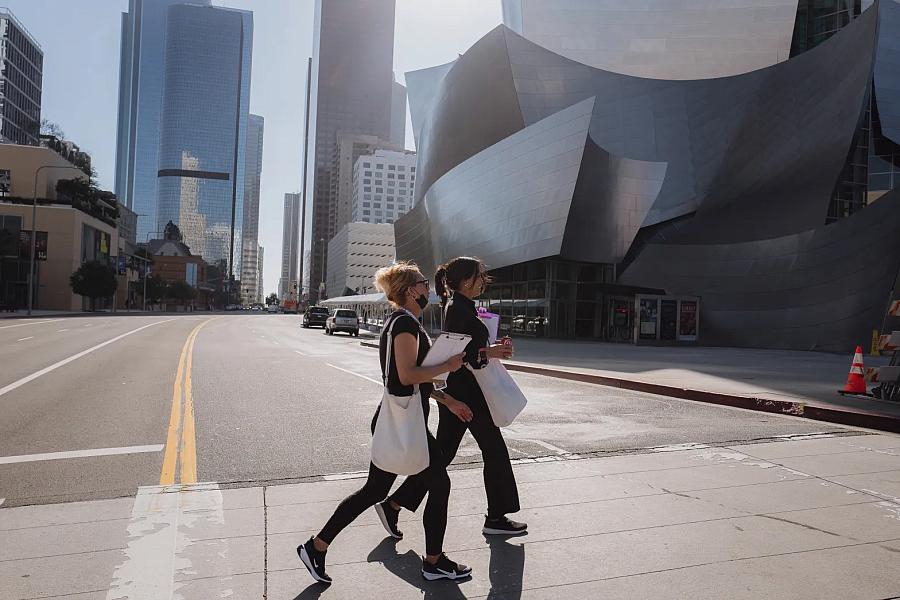
Frida Fierros and Daniela Sanchez stroll past the Walt Disney Concert Hall in downtown Los Angeles as they do outreach work for the TransLatin@ Coalition.
Zaydee Sanches / High Country News
Fierros arrived in Los Angeles in March 2023 with only $40 in her pocket after fleeing her hometown of Guadalajara, Mexico. That year, Mexico had the second-highest number of murders of transgender people in the world. Fierros sought refuge from both the threats she’d faced as a trans woman and the domestic violence she’d experienced throughout her life. She’d hoped to find safety in California, home to the nation’s largest population of trans Latinos and nearly a quarter of the nation’s trans immigrant population.
But as Fierros soon discovered, trans people in America experience significantly higher rates of domestic violence – also known as intimate partner violence – than their cisgender peers. The California Violence Experience Survey found that last year, trans people experienced physical violence seven times more frequently, and sexual harassment or assault five times more often, than cisgender people did, while 87% reported experiencing intimate partner violence at some point in their lives — the highest rate of any group surveyed.
At a young age, Fierros faced physical violence from her older brother and uncle, who refused to accept her femininity; her mother also struggled to come to terms with Fierros embracing her identity. Yet Fierros found support in her father, who bought the toddler Barbie dolls. By 13, Fierros was dressing as a girl in public. But the violence at home worsened, pushing her to leave. At 19, a transphobic attack left her with a permanently damaged left eye, and by 26, she was entangled in a physically abusive relationship; for three years, she would leave her partner and then return, repeating the same pattern. “I am not sure if it was love or fear,” Fierros reflected.
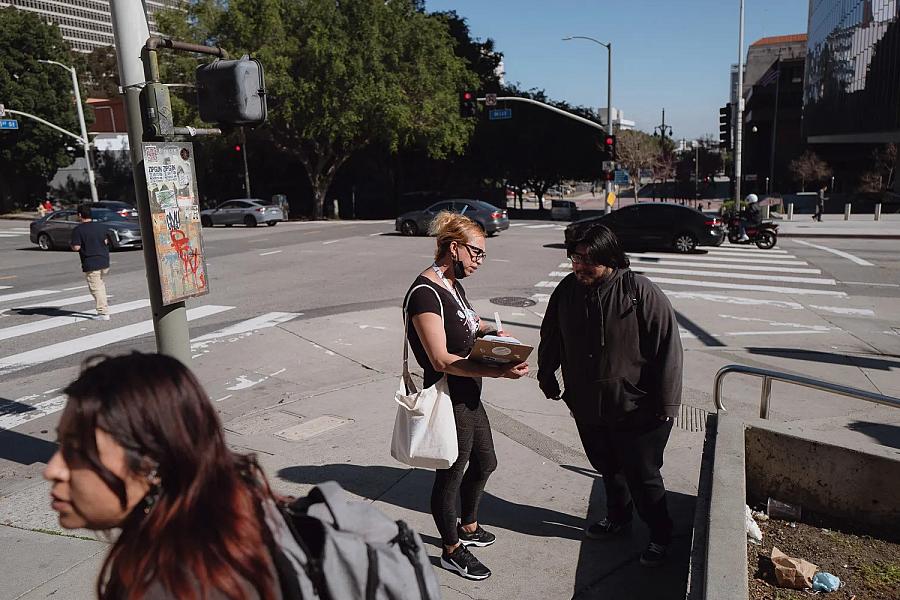
A pedestrian listens to Fierros as she goes over the pamphlets that showcase the services that the coalition provides.
Zaydee Sanchez / High Country News
The turning point came when Fierros, then 39, started receiving death threats from gangs. “It was never in my plans to migrate,” she said. “But I felt I wasn’t going to survive this one.”

“I hide my scars with tattoos.” said Fierros. The 42-year-old is becoming accustomed to living in Los Angeles after fleeing her home of Guadalajara, Mexico, a year ago.
Zaydee Sanchez / High Country News
Once she was in the U.S., friends directed her to the TransLatin@ Coalition in Los Angeles, which offered Fierros shelter at the organization’s Hope House.
Founded in 2009 by trans, gender-nonconforming and intersex (TGI) immigrants, the coalition offers legal assistance, housing, and economic and workforce development. The Hope House is a six-month transitional housing program that provides refuge for those forced out of their homes or seeking safety from abusive partners.
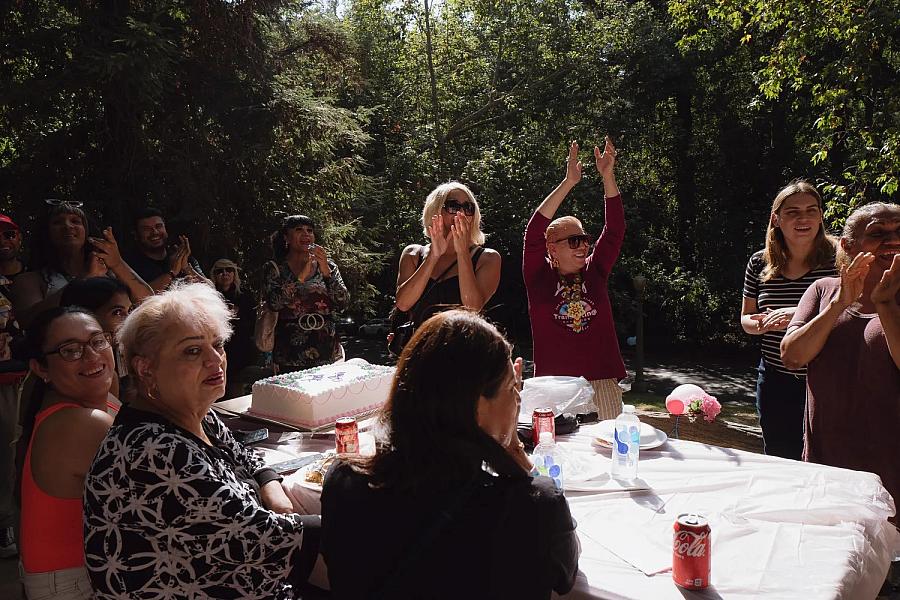
We are here to celebrate us,” says president of the TransLatin@ Coalition, Bamby Salcedo. The picnic gathering brought the TGI community to celebrate a day of love.
Zaydee Sanchez / High Country News
The program changed Fierros’ life. Without such support, trans people face discrimination and harassment. Housing and employment are often hard to find: In a 2023 survey of TGI adults in California, almost a third of respondents reported no income, even though more than a quarter had at least a bachelor’s degree. Survey author and Center on Gender and Equity Health founder Anita Raj explained that the lack of stable employment and housing elevates the risk for intimate partner violence. Program coordinator Rita Garcia regularly receives calls regarding such violence, but incidents are seriously underreported, partly due to a pervasive lack of trust in law enforcement. Victims also have a legitimate fear of becoming homeless and, worst of all, being injured or killed by a partner.
“I cannot tell a client who is experiencing these types of incidents to go to the police when their situation might worsen because they will be treated according to their genitals,” said Garcia. “Police still see transgender women like men. They do not see us as women.”
Historically, reaching out to law enforcement has been the first “official” response to domestic violence. But researchers have found it’s not always effective. Arrests do little to prevent repeat offenses.
The TransLatin@ Coalition maintains a middle ground in its relationship with law enforcement. Bamby Salcedo, the coalition’s president and founder, has assisted in trainings with the Los Angeles Police Department on how to work with the TGI community. Still, TGI people report feeling unsafe around police, describing encounters where they are questioned about completely unrelated matters, like sex work. All that has left Salcedo feeling skeptical about the effectiveness of the trainings.
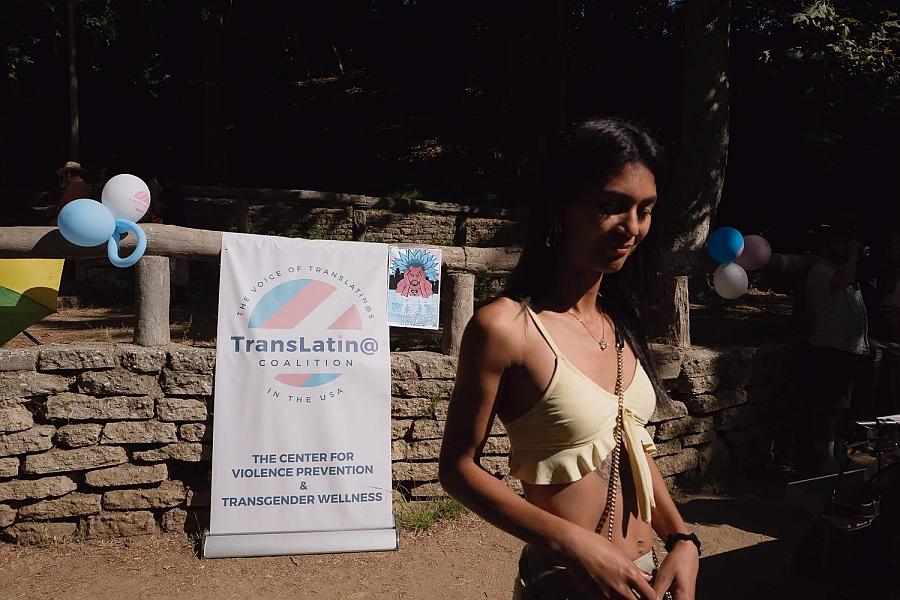
The TransLatin@ Coalition hosted a Spread the Love Picnic at Griffith Park, bringing the Los Angeles TGI community together for a day of love, food, and laughter.
Zaydee Sanchez / High Country News
LAPD Deputy Chief Ruby Flores serves as the department’s LGBTQ+ community outreach coordinator. Established in 1993, the position follows the example of similar liaisons in other major city police departments.
Flores acknowledges that the LAPD has not always treated the LGBTQ community well. “(But) there’s a sense of atonement when we talk about it with our community members,” she said. “That builds trust.”
We are beginning to have that safety that we always desired and required but have never had easy and safe access to when dealing with law enforcement.
The history Flores speaks of dates back to the late 1950s, when LAPD officers frequently harassed the patrons at Cooper Do-nuts, a 24-hour cafe where gay and transgender people gathered. During the same period, 17-year-old Chicana activist Nancy Valverde, who was challenging laws prohibiting gender-nonconforming attire, was arrested. In June 2023, the city of Los Angeles renamed the intersection of Main and Second Street as Cooper Do-nuts/Nancy Valverde Square. At the dedication ceremony, Flores apologized publicly to the activists on behalf of the LAPD.
But instances of police violence continue to occur. In December 2022, Annie Jump Vincente, a transgender woman, was arrested by the Los Angeles Sheriff’s Department for refusing to allow officers to enter her West Hollywood apartment building without a warrant. In July 2023, the department came under public scrutiny again after footage emerged showing an officer beating a transgender man for allegedly resisting a traffic stop.
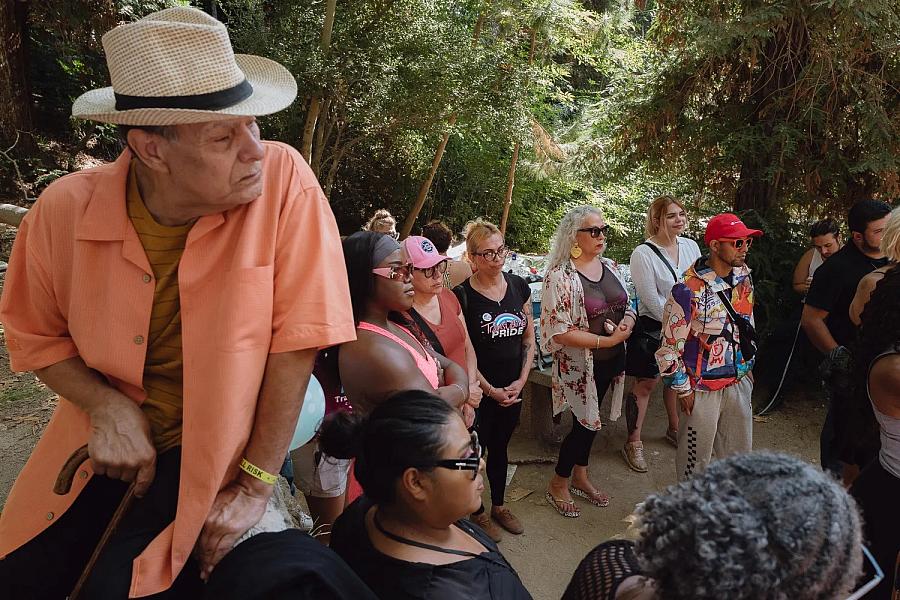
Fierros listens intently as Bamby Salcedo speaks on the significance of building community in keeping each other safe.
Zaydee Sanchez / High Country News
In response to this loss of trust in institutions, the TransLatin@ Coalition has partnered with the California vs Hate 211 hotline to document and respond to acts of hate against the TGI community. This approach connects those in need with resources, including legal, financial, mental health and mediation services, provides guidance on next steps, and conducts follow-ups. Law enforcement is never contacted without consent.
In 2022, the hotline received approximately 7,500 calls related to intimate partner violence. Though gender and race are not tracked, Garcia sees the service as crucial for the safety of the TGI community.
“211 was created to navigate and report these particular cases that are not being reported to the police,” Garcia said. “We are beginning to have that safety that we always desired and required but have never had easy and safe access to when dealing with law enforcement.”
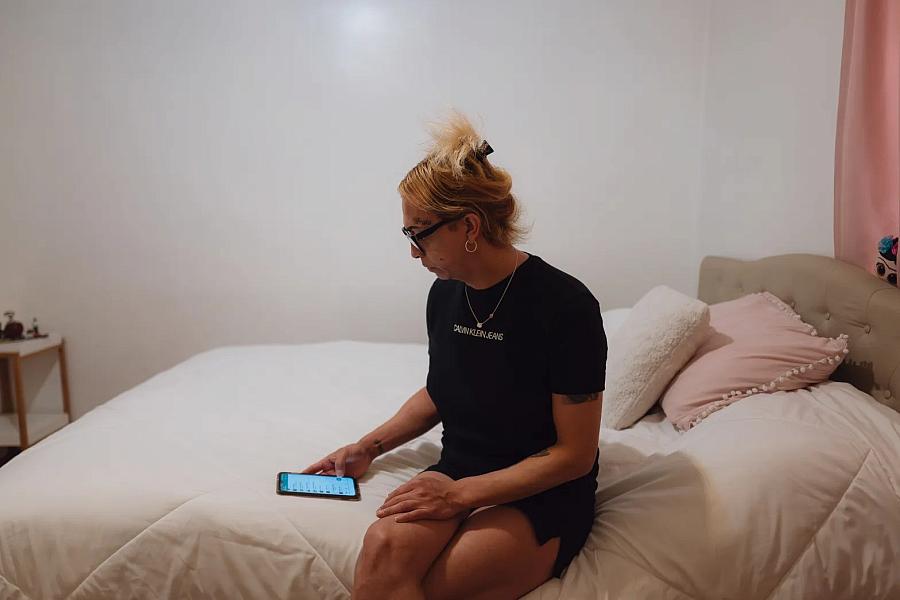
With a year living in Los Angeles, Fierros says she can’t help but miss home. “I know it is not safe to go back,” she said. “But I miss my loved ones dearly.”
Zaydee Sanchez / High Country News
Fierros has since graduated from Hope House and moved into an apartment with a roommate. Fierros’ romantic partner recently assaulted her, but she did not report him to the police. “I didn’t want to cause him harm and potentially affect his immigration status,” she said. “I am not sure if it’s that I cared or loved him, or maybe I was just dumb, but I couldn’t be that cruel.”
Still, she ended the relationship. The friendship and support Fierros found in the TransLatin@ Coalition has helped reshape her idea of what a healthy romantic relationship should be.
And, with the help of the TransLatin@ Coalition, Fierros obtained a work permit and has been working for the coalition as an outreach specialist for the past three months. She has also developed a supportive relationship with her mother, something that has weighed heavily on her for years. She’s currently taking English classes and studying for her driver’s license. As she looks to the future, she imagines having her own food stand. “I can do that,” she said. “I can be a businesswoman.”
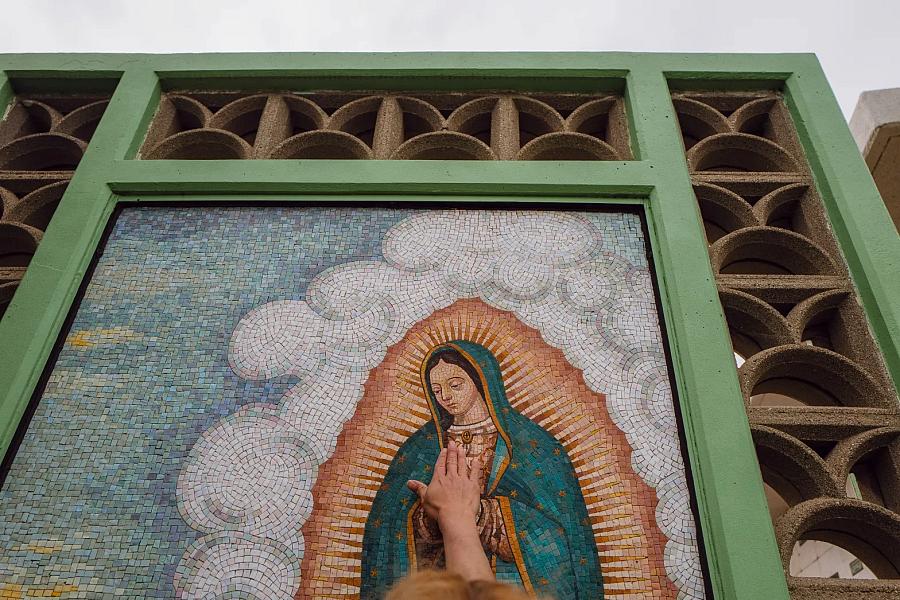
“Much of my resilience comes from my faith,” says Fierros as she puts her hand on an image of the Virgen de Guadalupe.
Zaydee Sanchez / High Country News

